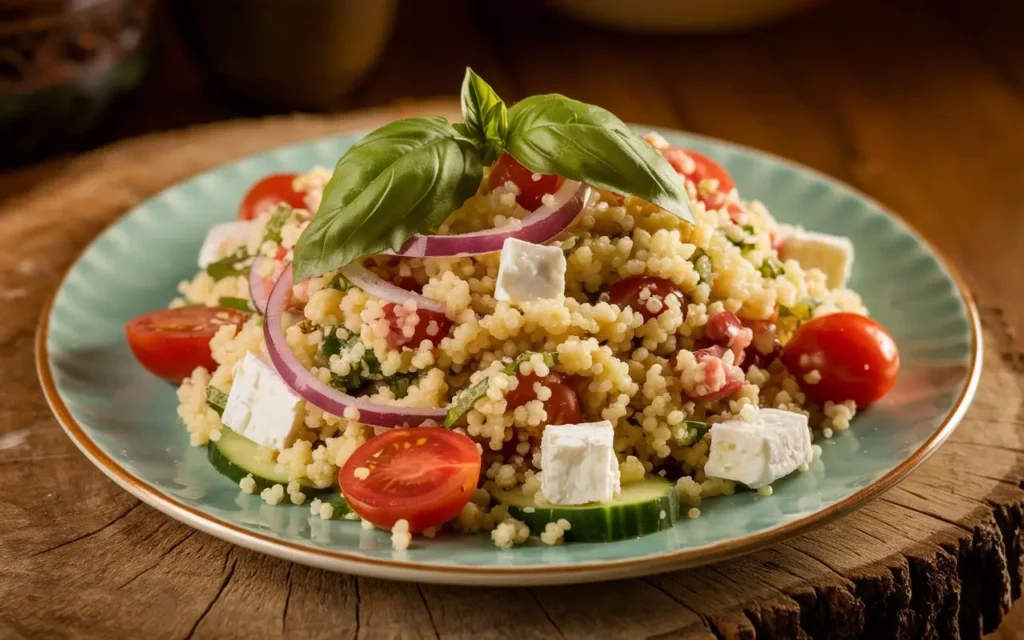Moroccan style couscous is not only a culinary delight but also offers several health benefits when consumed as part of a balanced diet.
Made from semolina wheat, it is a good source of complex carbohydrates, which provide steady energy throughout the day.
Additionally, couscous is low in fat, contains no cholesterol, and offers a moderate amount of protein.
The dish’s nutritional value significantly increases when combined with traditional Moroccan ingredients like vegetables, lean meats, legumes, and spices.
Nutritional Breakdown
1. Low in Calories and Fat: A typical serving of Moroccan couscous is relatively low in calories, with around 176 calories per cup of cooked couscous.
This makes it a good option for those managing their weight. It’s also virtually fat-free, which contributes to its status as a heart-healthy food.
2. Rich in Fiber: When couscous is paired with vegetables and legumes, it becomes a rich source of dietary fiber, which is essential for digestive health. Fiber helps regulate blood sugar levels and promotes satiety, reducing the likelihood of overeating.
3. Good Source of Plant-Based Protein: Couscous itself contains about 6 grams of protein per serving. When combined with chickpeas or lentils, traditional in Moroccan recipes, the protein content increases, making it a valuable component of vegetarian and vegan diets.
4. Packed with Vitamins and Minerals: Traditional Moroccan couscous often includes ingredients like carrots, zucchini, and tomatoes, which are rich in vitamins A and C. Spices such as turmeric, cumin, and cinnamon not only add flavor but also contribute antioxidants and anti-inflammatory properties, benefiting overall health.
Health Benefits
1. Supports Heart Health: The low-fat, high-fiber content of Moroccan couscous supports heart health by reducing cholesterol levels and promoting healthy blood circulation. The addition of olive oil, a staple in Moroccan cooking, introduces healthy fats that are good for cardiovascular health.
2. Promotes Digestive Health: The fiber in couscous and accompanying vegetables helps maintain a healthy digestive system. It prevents constipation and promotes a healthy gut microbiome, which is essential for overall well-being.
3. Provides Sustained Energy: The complex carbohydrates in couscous are digested slowly, providing sustained energy without the spikes and crashes associated with simple carbs. This makes it an excellent choice for a filling, satisfying meal.
4. Versatile and Customizable: Moroccan couscous can be adapted to various dietary needs. For example, it can be made gluten-free by using alternatives like corn or quinoa couscous. Additionally, the inclusion of a variety of vegetables, lean proteins, and legumes makes it suitable for many diet plans, including Mediterranean and plant-based diets.
Considerations and Tips for a Healthier Couscous
1. Watch Portion Sizes: While couscous is healthy, portion control is key, especially for those watching their carbohydrate intake. Aim for a serving size of about 1/2 to 1 cup.
2. Opt for Whole Grain Varieties: Whenever possible, choose whole grain couscous, which retains more fiber and nutrients compared to refined versions. This option can help regulate blood sugar levels and support a healthy digestive system.
3. Add Plenty of Vegetables: Enhance the nutritional profile of your couscous by adding a variety of vegetables. Roasted or sautéed vegetables like bell peppers, carrots, and zucchini not only add flavor but also increase the fiber, vitamin, and mineral content of your meal.
4. Include Lean Proteins: To make your couscous dish more filling and nutritionally balanced, add lean proteins such as grilled chicken, fish, or chickpeas. This addition boosts the protein content, making the dish suitable as a main meal.
Conclusion
Moroccan style couscous is a nutritious, versatile dish that can be part of a healthy diet. It is low in fat, provides complex carbohydrates for sustained energy, and can be enriched with various nutrient-dense ingredients. By making mindful choices about portion sizes, types of couscous, and the ingredients used, you can enjoy a meal that is not only delicious but also beneficial to your health.
By integrating Moroccan couscous into your diet, you are embracing a meal that offers both cultural richness and nutritional value, making it a worthy addition to your weekly meal plan.

